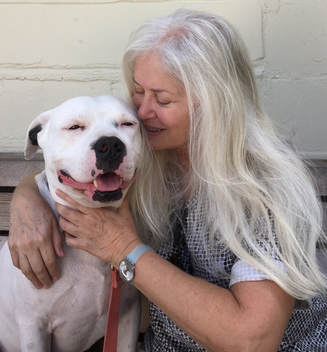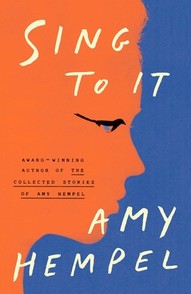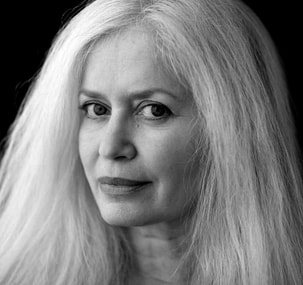October 2018: Featured Artist |
|
Award-Winning Author:
Amy Hempel
~~~
|
Amy Hempel is the author of four collections of stories: Reasons to Live (Knopf, 1985), At the Gates of The Animal Kingdom (Knopf, 1990), Tumble Home (Scribner, 1997) and The Dog of the Marriage (Scribner, 2005). These were assembled as The Collected Stories (Scribner, 2006) and won the Ambassador Award for Best Fiction of the Year. The volume was a finalist for the PEN/Faulkner Award and was named one of the New York Times Ten Best Books of the Year. Her fiction and nonfiction have appeared in Harper’s, Esquire, The New York Times Magazine, Vanity Fair, The Harvard Review, The Southampton Review, GQ, The Quarterly, and many others. Her stories have been anthologized in The Best American Short Stories, The Pushcart Prize, Best Non-Required Reading and more. Individual stories have been translated into more than 20 languages. With Jim Shepard, she co-edited an anthology of poems titled Unleased (Crown,1995), and with Jill Ciment, she co-wrote the thriller The Hand that Feeds You (Scribner, 2015) as A.J. Rich.
|
|
Amy is the recipient of fellowships from the Guggenheim Foundation and the United States Artists Foundation. Her numerous awards include an award from the American Academy of Arts & Letters, the PEN/Malamud Award and the Rea Award for the Short Story. She is a member of The American Academy of Arts & Sciences, and she was just elected to the American Academy of Arts & Letters.
Amy attended Whittier College and San Francisco State University, and she studied with Gordon Lish at Columbia University (not the MFA program). She has taught at Harvard, Bennington, Princeton, NYU, Columbia, Duke, Sarah Lawrence, and currently teaches at Stony Brook Southampton. Her new collection of stories, Sing to It, will be published by Scribners in the spring of 2019. |
Click on the book cover above for more information about Amy's new book .
|
Pearson Marx, contributor, spoke with Amy about her writing process, the challenges she has faced in her career and where she has found inspiration.
Did you grow up wanting to be a writer?
No, I wanted to be a veterinarian, until I took organic chemistry - and failed it! Writing was the second thing because I always loved reading.
How did you become a writer? Was it a series of willed actions, like ‘I will go and take this course,’ or ‘I will send this story out?’
Yes. I did come to believe - and this is key - that will counted more than talent. I really did believe that if I worked at it harder than others, I would have a chance. I’ve seen that in classes and work shops I’ve taught for, God, more than forty years. It’s often the person who doesn’t have a default position, who must make this work, who must get this right, who works much harder and reads more and does more, who produces something more memorable than the person you look at and say, ‘Well, she’s really talented!’ Laughing.
You've always been such a generous mentor and friend to me and to many other writers. In your experience as a writer and as a teacher, what is the most common reason for a writer’s will to fail?
A certain kind of criticism can shut somebody down for a while, but I think that’s just part of it. You have a crisis of confidence, and then you rally, you get back to work.
Can you share the wonderful story about Raymond Carver that inspired you to start writing again after you stopped for a while?
I had barely begun a novella I wrote years ago called Tumble Home, and somebody whose opinion mattered didn’t like – literally - the few first pages, and it shut me down for two and a half years as far as fiction goes. And that’s my fault. And what got me back to work was something Raymond Carver said. He’d given a reading and somebody came up after and told him how great the story was, and Carver, who was a very modest man, said, ‘It’s what I can do.’ And I was very moved by that, very moved, and it was the answer for me. Well, of course, you can only do what you can do. You just do what you can do, because the alternative is unacceptable, and that is to stop.
The other day, we were discussing the most important quality a writer can have. You said curiosity, I thought faith. I asked a male friend the same question, and he said, Arrogance…the kind of arrogance that male writers seem to be able to access more easily than female writers - that conviction that one has something worth saying, worth reading.
I’ve never felt arrogant. I mean, I would’ve liked to…maybe. That’s never been something I’ve felt in really any situation. I would settle for just confidence [laughing], which is hard enough to muster. Just simple confidence! And trying not to be so judgy.
Can you name some of the writers who have inspired you?
Grace Paley. Mary Robison. The Brontes…As a little girl, I made a fort and read all the Brontes’ novels inside it.
When I first read A Room of One’s Own, as a young girl who wanted to write, I thought that Virginia Woolf meant that a woman writer needs, literally, just her own room! As I got older, I realized that Woolf meant that a woman needs access to her own capital and to education and to opportunities to make money - and that the necessary room of one’s own is not just a physical space, it’s also a kind of psychic space - freedom from the pressure to always be the angel in the house, tending to those she loves, putting everyone’s needs ahead of her own, especially her creative work. What does the notion of Woolf’s room mean to you?
I think of it as being selfish in the best sense of that word. And that’s really hard to do. I think it’s harder for women to do than men, to make a huge generalization, because we tend to be trained young to please, to be pleasers, and it doesn’t serve us.
I often feel that in order to write I have to get everything on my to-do list done, that I won’t be able to concentrate until I’ve run all the errands, written the thank you notes…when in fact the act of writing makes those things recede.
Yes, we have to do the opposite of what we have been trained to do, and what we think we’re supposed to do, if we’re going to get the work done, because there will always be another e-mail to answer and another trip to the dry cleaners to make. It’s endless.
Is there an emotional state in which you find it easiest to write?
Different moods, different times, different kinds of work….But I will say that I have several times written my way out of the abyss. But if you do that, you have to be really careful not to write something cathartic. That cannot be the aim, because the reader doesn’t care how you feel for having written it. You want to make the reader feel something. It was kind of a challenge to write from a place of contentment - how do you ramp this up? Where’s the energy in that, for writing? You’re contented. That’s hard for me.
What are you reading now?
A wonderful memoir called Godspeed by Casey Legler, which I’m loving. I find I’m drawn to personal essays and memoir more and more.
Can you tell us why?
I think one reason people generally read memoir is to find out, how did you get through this? How did you get through something hard? Maybe it’ll help me get through something hard. How resilient are we? And if it’s a happy experience people are writing about in memoir, how wonderful! So that’s what it feels like to have everything you ever wanted, you know?
The theme of this issue of Sanctuary is transitions and change. And there’s a phrase in dog rescue: Even positive change can be stressful. And one thing that’s so amazing about you is that no matter how scary it is, you embrace change. You move, you live in different places, you take different jobs, you accept challenges.
Well, I think I’ve overdone it a bit! [Laughing] The last big move was quite exhausting. It took a lot out of me. I’m feeling like I need different kinds of change now.
Where do you find your sanctuary? (#WheresYourSanctuary)
There will always be work with dogs of some kind - that’s my sanctuary. But I feel that maybe now sanctuary for me is going to include something it didn’t include before.
Like maybe just staying put for a while?
Yes, yes.
Did you grow up wanting to be a writer?
No, I wanted to be a veterinarian, until I took organic chemistry - and failed it! Writing was the second thing because I always loved reading.
How did you become a writer? Was it a series of willed actions, like ‘I will go and take this course,’ or ‘I will send this story out?’
Yes. I did come to believe - and this is key - that will counted more than talent. I really did believe that if I worked at it harder than others, I would have a chance. I’ve seen that in classes and work shops I’ve taught for, God, more than forty years. It’s often the person who doesn’t have a default position, who must make this work, who must get this right, who works much harder and reads more and does more, who produces something more memorable than the person you look at and say, ‘Well, she’s really talented!’ Laughing.
You've always been such a generous mentor and friend to me and to many other writers. In your experience as a writer and as a teacher, what is the most common reason for a writer’s will to fail?
A certain kind of criticism can shut somebody down for a while, but I think that’s just part of it. You have a crisis of confidence, and then you rally, you get back to work.
Can you share the wonderful story about Raymond Carver that inspired you to start writing again after you stopped for a while?
I had barely begun a novella I wrote years ago called Tumble Home, and somebody whose opinion mattered didn’t like – literally - the few first pages, and it shut me down for two and a half years as far as fiction goes. And that’s my fault. And what got me back to work was something Raymond Carver said. He’d given a reading and somebody came up after and told him how great the story was, and Carver, who was a very modest man, said, ‘It’s what I can do.’ And I was very moved by that, very moved, and it was the answer for me. Well, of course, you can only do what you can do. You just do what you can do, because the alternative is unacceptable, and that is to stop.
The other day, we were discussing the most important quality a writer can have. You said curiosity, I thought faith. I asked a male friend the same question, and he said, Arrogance…the kind of arrogance that male writers seem to be able to access more easily than female writers - that conviction that one has something worth saying, worth reading.
I’ve never felt arrogant. I mean, I would’ve liked to…maybe. That’s never been something I’ve felt in really any situation. I would settle for just confidence [laughing], which is hard enough to muster. Just simple confidence! And trying not to be so judgy.
Can you name some of the writers who have inspired you?
Grace Paley. Mary Robison. The Brontes…As a little girl, I made a fort and read all the Brontes’ novels inside it.
When I first read A Room of One’s Own, as a young girl who wanted to write, I thought that Virginia Woolf meant that a woman writer needs, literally, just her own room! As I got older, I realized that Woolf meant that a woman needs access to her own capital and to education and to opportunities to make money - and that the necessary room of one’s own is not just a physical space, it’s also a kind of psychic space - freedom from the pressure to always be the angel in the house, tending to those she loves, putting everyone’s needs ahead of her own, especially her creative work. What does the notion of Woolf’s room mean to you?
I think of it as being selfish in the best sense of that word. And that’s really hard to do. I think it’s harder for women to do than men, to make a huge generalization, because we tend to be trained young to please, to be pleasers, and it doesn’t serve us.
I often feel that in order to write I have to get everything on my to-do list done, that I won’t be able to concentrate until I’ve run all the errands, written the thank you notes…when in fact the act of writing makes those things recede.
Yes, we have to do the opposite of what we have been trained to do, and what we think we’re supposed to do, if we’re going to get the work done, because there will always be another e-mail to answer and another trip to the dry cleaners to make. It’s endless.
Is there an emotional state in which you find it easiest to write?
Different moods, different times, different kinds of work….But I will say that I have several times written my way out of the abyss. But if you do that, you have to be really careful not to write something cathartic. That cannot be the aim, because the reader doesn’t care how you feel for having written it. You want to make the reader feel something. It was kind of a challenge to write from a place of contentment - how do you ramp this up? Where’s the energy in that, for writing? You’re contented. That’s hard for me.
What are you reading now?
A wonderful memoir called Godspeed by Casey Legler, which I’m loving. I find I’m drawn to personal essays and memoir more and more.
Can you tell us why?
I think one reason people generally read memoir is to find out, how did you get through this? How did you get through something hard? Maybe it’ll help me get through something hard. How resilient are we? And if it’s a happy experience people are writing about in memoir, how wonderful! So that’s what it feels like to have everything you ever wanted, you know?
The theme of this issue of Sanctuary is transitions and change. And there’s a phrase in dog rescue: Even positive change can be stressful. And one thing that’s so amazing about you is that no matter how scary it is, you embrace change. You move, you live in different places, you take different jobs, you accept challenges.
Well, I think I’ve overdone it a bit! [Laughing] The last big move was quite exhausting. It took a lot out of me. I’m feeling like I need different kinds of change now.
Where do you find your sanctuary? (#WheresYourSanctuary)
There will always be work with dogs of some kind - that’s my sanctuary. But I feel that maybe now sanctuary for me is going to include something it didn’t include before.
Like maybe just staying put for a while?
Yes, yes.
|
Photo Credit: Vicki Topaz
|
To learn more about Amy's work,
visit her author's page on Simon & Schuster: |





